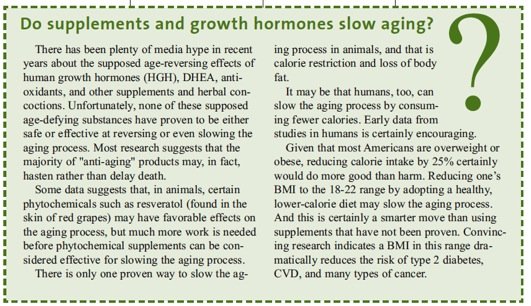Consuming Fewer Calories Slows Aging
Consuming Fewer Calories Slows Aging
The latest statistics from the Center for Disease Control in Atlanta show that more Americans in 2003-2004 were overweight and obese than 4 years earlier. This latest data shows that 32% of American adults are now obese and another 34% are overweight.1 Today, it is likely that less than one third of all American adults are normal weight, and with a BMI under 25.
This same study shows that both obesity and overweight are increasing even faster in children than in adults. Overweight and obese people are at a much higher risk of developing cardiovascular diseases, Type 2 diabetes, and several common types of cancer. This results in shortened life expectancy due to excess calorie intake and greater stores of body fat.Many other disease processes are also becoming increasingly associated with excess calorie intake, including Alzheimer?s disease, osteoarthritis, gallstones, and fatty liver, to name just a few. Many of these diseases may result, in part, from insulin resistance and the hormonal and metabolic abnormalities associated with it.Animals Live Longer on Fewer CaloriesIn the 1930s, it was first demonstrated that calorie restriction could slow the aging process and increase the life expectancy of rodents. Even middle-aged mice (19 months), placed on a calorie-restricted diet, have been shown to live 42% longer on average than control mice allowed to eat all they wanted.Today, there is no question that lower calorie intake improves numerous biological markers of aging, including damage to DNA, insulin sensitivity, inflammatory proteins, lower body temperature, lower T-3 levels, dyslipidemia, and many other hormone and growth factors.2 Many of the risk factors for more rapid aging are also risk factors for earlier morbidity and mortality from cardiovascular disease (CVD), cancer, and Type 2 diabetes.Dogs fed 75% of the calories consumed by control dogs were found to have increased insulin sensitivity, lower insulin levels, and a marked reduction in chronic diseases including osteoarthritis.3Monkeys given free access to food were 2.6 times more likely to die each year, on average, than those fed 25% fewer calories. Those monkeys with the highest insulin levels were 3.7 times more likely to die than those with the lowest insulin levels.4American men in their 60s are 6 times more likely to have clinically significant osteoarthritis of their knees than men with a BMI of less than 25.Do People Eating Fewer Calories Age More Slowly?Given ethical constraints and the long life span of humans, it will be quite some time before we have data proving calorie restriction in humans significantly increases life expectancy. But growing evidence based on biological markers of aging, as well as the diseases that kill most Americans, suggests that it does.For example, long-term calorie restriction in humans has been shown to not only lower fasting insulin levels, but to markedly improve many other cardiovascular disease risk factors, and is also associated with much less thickening of the carotid artery walls.5 Another study of people restricting calories for about 8 years on average found improved heart function. Loss of diastolic heart function is a well-accepted marker of aging in humans.


Bottom Line:There is no doubt that staying thin while eating mostly minimally processed plant foods will dramatically cut the risk of developing CVD, cancer, Type 2 diabetes, and numerous other ills that can dramatically reduce the quality of one?s life.By James J. Kenney, PhD, RD, FACN.1. JAMA 2006;295: 1549-552. Mech Aging Dev. 2005;126: 913-223. J Nutr 2003;133:2887-924. J Gerontol. 2003;58A:212-195. Proc Natl Acad Sci USA. 2004;47:398-402


